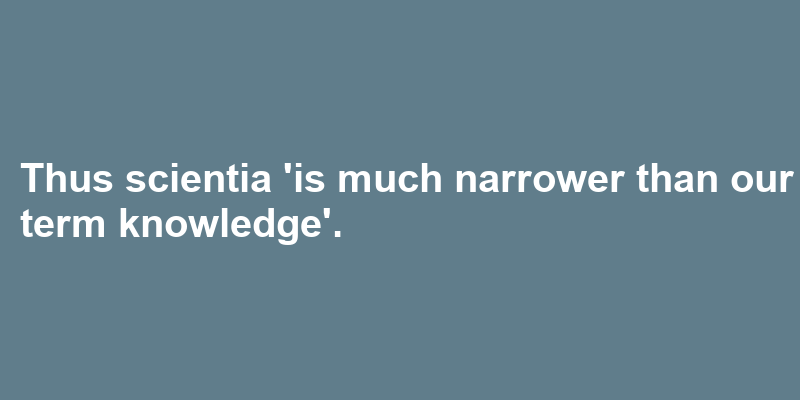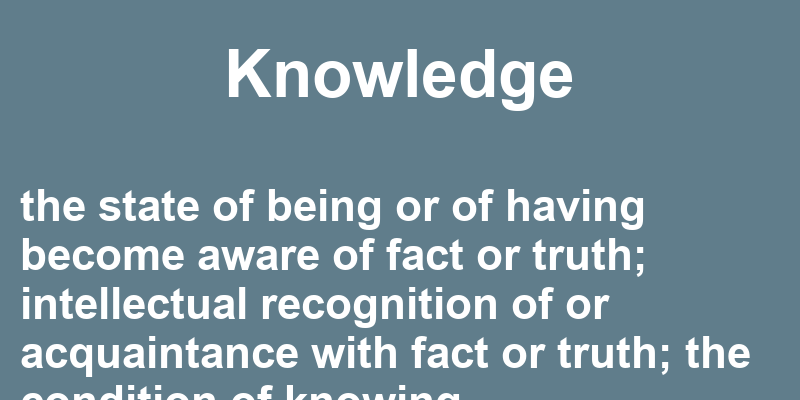Definition of Knowledge
knowledge (noun) - the state of being or of having become aware of fact or truth; intellectual recognition of or acquaintance with fact or truth; the condition of knowing
View other definitions
How can knowledge be used in a sentence?
Thus scientia 'is much narrower than our term knowledge'.
Source
nullNot having the mechanism for exposing the knowledge is a failure.
Source
nullWe used the term knowledge because the aim was to go beyond software.
Source
nullOne parsimonious explanation for a gap in knowledge is human or personal ignorance.
Source
nullIn other words, he's see the fad as using the term knowledge in place of information.
Source
nullThis knowledge is the stock in trade of the highly paid dress designers, but it is innate to most girls.
Source
nullThat what we call knowledge is limited to those things either set down in Scripture or deduced therefrom?
Source
nullThe goal of access to knowledge is to improve access to all four of these components of the knowledge economy:
Source
nullComplete knowledge is impossible; nay, what we call knowledge of any part of the system is inherently imperfect.
Source
null_For a knowledge of liberal sciences, but a controlled and exact knowledge_, forms men who will love the truth ....
Source
nullThe other vision: knowledge is not a classification of the world but an ongoing negotiation within knowledge communities.
Source
nullI decided not to use the term knowledge worker in my paper given the origin of the name and the way it is (mis) used today.
Source
nullIndeed, the word "acknowledged" -- the word used by Scott McCabe to characterize Cramer's statement -- derives from the word "knowledge."
Source
nullIdealistically my knowledge is the most important thing I have brought with me here, even if it will be the last thing my neighbors will benefit from.
Source
nullBut let us turn to that knowledge which God has given, and which therefore does not admit of improvement by lapse of time, this is _religious knowledge_.
Source
nullAnd the Master's answer would come in that clear, quiet voice of His, "yes, tarry: you have knowledge enough, but _knowledge is not enough_, there must be power."
Source
nullMike's concern that IF the supernatural were real and MN cannot address this that somehow it will miss certain knowledge is interesting from a philosophical perspective.
Source
null"I believe that before Mexico can realize a true understanding and stewardship of its natural resources, we must first achieve what I call the knowledge revolution," concludes
Source
nullYes, we are knowledge machines, but Deutsch is really using the term "knowledge" in a more expansive and at the same time, a more precise way than most readers will first assume.
Source
nullHe has disgraced his agency and himself in his actions, which to my knowledge is the only federal agency to have challenged the transition review teams now at work in the government.
Source
nullPhysicists, novelists, logicians, and art historians have recognized for some time that what we call our knowledge of reality consists of images of it that we ourselves have fashioned.
Source
nullI am using the term knowledge in its widest possible sense; and the question is, what subjects to select by training and discipline, in which the object I have just defined may be best attained.
Source
nullFor the cure of these evils Arnold's proposed remedy was Culture, which he defined as a knowledge of the best that has been thought and done in the world and a desire to make the best ideas prevail.
Source
nullBesides when the statute speaks of "knowledge," aside from the expression "wilfully" it means _knowledge_ as a _fact_ -- not any _forced presumption of knowledge_ against the clear facts of the case.
Source
nullThat is the point that the student ought to grasp; this knowledge of God, not the belief in Him, not the faith in Him, not only vague idea concerning Him, but the _knowledge_ of Him, is possible to man.
Source
nullThis certain knowledge is results of our very strong values, that is guiding our way of life, and unshakable belief in; Santa Clause, Tooth Friaries, and all manner of Hobgoblins, not forgetting the Pixies.
Source
nullThe best way to improve in knowledge is to abide and abound in all the instances of serious godliness; for, if any man do his will, he shall know of the doctrine of Christ, shall know more and more of it, John vii.
Source
null'_Generally_,' he says, '_let this be a rule_, that all partitions of knowledge be accepted rather for LINES and VEINS, than for _sections_ and _separations_, and that _the continuance and entireness of knowledge_ be preserved.
Source
nullAs always, I try to respond that unfortunately my knowledge is all I have to offer, but just how hollow does that sound when my knowledge is paltry and un-translated, and when my new PC-issued TREK mountain bike just arrived yesterday?
Source
nullHe thinks that you were drowned -- as, indeed, so did I-- the time that you were thrown overboard without my knowledge -- mind that, _without my knowledge_ -- and your father in his madness thinks he is commissioned by God to avenge your death.
Source
null"To proclaim your knowledge is assured because you know something about science because you read Science Fiction is akin to those people who watch medical soap-operas and remember how to apply the Heimlich Manoeuvre to save someone's life from choking."
Source
nullHence a knowledge of Physics, particularly the physics which Democritus taught, was needful to deliver men from false hopes and false fears. [784] (ii.) _Ignorance of the nature of man, of his faculties, powers, and the sources and limits of his knowledge_, from whence arise illusions, prejudices, and errors.
Source
nullIrrespective of Plato's position, it is easy to perceive that the term knowledge is used to denote things as far apart as intimate and vital personal realization, -- a conviction gained and tested in experience, -- and a second-handed, largely symbolic, recognition that persons in general believe so and so -- a devitalized remote information.
Source
nullBrahmans, that of the Aupanishadas, which has laid down for its first doctrine that _works are for the sake of understanding_, that the practice of ritual is of value only as a help to the mystic knowledge of the All. But here they have not halted; they have gone a further step, and declared that _knowledge once attained, works become needless_.
Source
nullBoulting's search for the stars, however, proved frustrating; his only interviewees, excluding those actually involved in proceedings, were the Russian darts player Anastasia Dobromyslova and the former television personality Angus Loughran, neither of whom to the best of my knowledge is a cage fighter? though they'd probably be fairly well-matched.
Source
nullIt is plain that the temptation under which man fell in paradise was this, an ambitious curiosity after knowledge which was not allowed him: next came the desire of the eyes and the flesh, but the forbidden tree was called the tree of _knowledge_; the Tempter _promised_ knowledge; and after the fall Almighty God pronounced, as in the text, that man had gained it.
Source
nullI take it that the whole object of education is, in the first place, to train the faculties of the young in such a manner as to give their possessors the best chance of being happy [74] and useful in their generation; and, in the second place, to furnish them with the most important portions of that immense capitalised experience of the human race which we call knowledge of various kinds.
Source
null_Sound knowledge_, a _sound head_, _strong faith_, and _great grace_ -- all these combined -- may indeed preserve one whom the necessity of his position may lead into un-Catholic schools; but no one will deny that this anti-Catholic literature must exercise a most baneful influence over all those who, without sufficient preparation from nature or grace, plunge into it, in the pursuit of amusement or knowledge.
Source
nullIf the imagery of logic or passion ever comes to convey _knowledge_, it does so by virtue of a concomitant physical adjustment to external things; for the nerve of real or transcendent knowledge is the notice which one part of the world may take of another part; and it is this momentous cognisance, no matter what intangible feelings may supply terms for its prosody, that enlarges the mind to some practical purpose and informs it about the world.
Source
nullThe reason why parents are to be consulted is, because they deliberate from judgement, knowledge, and love; from _judgement_, because they are in an advanced age, which excels in judgement, and discerns what is suitable and unsuitable: from _knowledge_, in respect to both the suitor and their daughter; in respect to the suitor they procure information, and in respect to their daughter they already know; wherefore they conclude respecting both with united discernment: from
Source
null
Tips for Using knowledge in a Sentence
You may have an easier time writing sentences with knowledge if you know what words are likely to come before or after it, or simply what words are often found in the same sentence.
Frequent Predecessors
Words that often come before knowledge in sentences. For example: "of knowledge" or "the knowledge"
- of
- the
- a
- and
- our
- his
- this
- their
- that
- my
Frequent Successors
Words that often come after knowledge in sentences. For example: "knowledge of" or "knowledge and"
- of
- and
- .
- that
- is
- about
- in
- to
- or
- which
Associated Words
Words that aren't necessarily predecessors or successors, but are often found in the same sentence.
- wisdom
- skills
- expertise
- understanding
- facts
- skill
- learning
- sharing
- experience
- practical
Alternate Definitions
- knowledge (noun) - a perception, judgment, or idea which is in accord with fact or truth; that which is known
- knowledge (noun) - acquaintance with things ascertained or ascertainable; acquired information; learning
- knowledge (noun) - specific information; notification; advertisement
- knowledge (noun) - cognizance; notice; recognition
- knowledge (noun) - acknowledgment
- knowledge (noun) - the act or state of knowing; clear perception of fact, truth, or duty; certain apprehension; familiar cognizance; cognition
- knowledge (noun) - that which is or may be known; the object of an act of knowing; a cognition; -- chiefly used in the plural
- knowledge (noun) - that which is gained and preserved by knowing; instruction; acquaintance; enlightenment; learning; scholarship; erudition
- knowledge (noun) - that familiarity which is gained by actual experience; practical skill
- knowledge (noun) - scope of information; cognizance; notice

